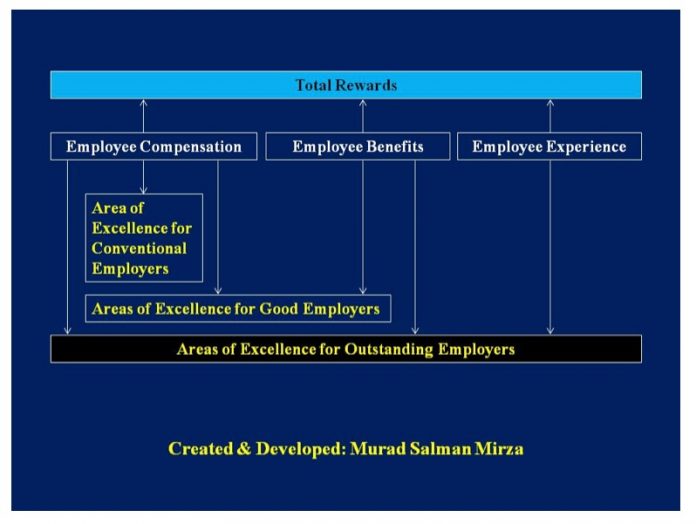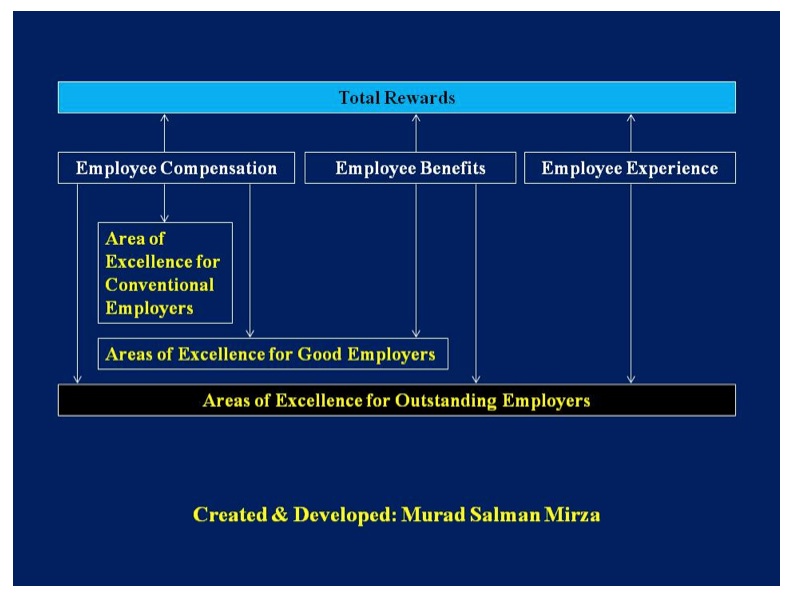
There has been an increased emphasis on employee experience recently as organizations try to lure desired talent into their ranks with innovative talent management strategies that ensure low attrition rates and a robust employer brand while triggering healthy doses of intrinsic motivation for unfettered employee engagement. This has become a distinguishing factor between outstanding employers and others striving to maintain/sustain a significant foothold in the digital world with a multigenerational workforce. Gone are the days when budding professionals depended upon the paternalistic instincts of their employers to provide them with a viable career path. The capable professional of today is more informed, incisively skilled, and comes with a wealth of knowledge that enables leveraged negotiating targeted to achieve maximum gains within a mutually agreed frame of reference. Consequently, total rewards has evolved to incorporate employee experience in addition to the traditional norms of compensation and benefits, i.e.:

This article introduces a way of self-assessment for a liberated and cognizant professional who wants to proactively ensure relevance in the foreseeable future despite the increasing gains made by Artificial Intelligence (AI) in the workplace. Key dimensions in the respective context (not in any particular order) with sample questions are as follows:
Employee Value Proposition (EVP) Experience
- Was I able to clearly identify the value gained from working in this organization?
- Did the EVP align with my professional goals and expectations?
- Was I willing to compromise on anything that is not completely aligned with my professional goals and expectations?
- Did I get good answers on my questions for clarifying any ambiguous aspects?
- Was I motivated to proceed with the candidature for the vacancy?
Hiring Experience
- Did the job specification adequately reflect all the mandated, expected, and desired aspects of the role?
- Was the hiring function forthcoming in terms of providing good answers to my questions?
- Did I clearly understand all the stages involved in hiring?
- Did the hiring process proceed without a glitch?
- Will I recommend the organization to others, even if I didn’t get the job?
Orientation Experience
- Was I clear on all the stages associated with orientation?
- Did I gain significant knowledge about the key functions of the organization and my role in the respective context?
- Was the HR/Talent Management function helpful in providing good answers to my questions?
- Were the people involved in orientation willing and able to effectively conduct the various aspects of orientation?
- Did I gain a sound understanding of my potential career path(s)?
Performance Management Experience
- Is the current process of performance management fair?
- Are the criteria for gauging performance clear to me?
- Have I significantly benefitted from engaging in performance-related discussions with my supervisor(s)?
- Is my talent potential being put to good use in the organization?
- Are my views/concerns with respect to constraints on enabling good performance addressed effectively?
Career Development and Growth Experience
- Am I aware of the career development and growth opportunities available with respect to my role?
- Have I been given solid opportunities to grow and advance my career?
- Do the available career development and growth opportunities align with my professional ambitions?
- Have I been assigned a good mentor for navigating my professional journey?
- Does the work environment motivate me to climb the corporate ladder within the organization?
Relationship with Peers Experience
- Do I feel comfortable working with my peers?
- Are my peers willing and able to do a good job in team assignments?
- Can I depend upon the support of my peers in case of emergency delegation of work due to extenuating circumstances?
- Am I motivated to engage in social and informal activities with my peers?
- Have I earned the respect of my peers?
Relationship with Supervisors Experience
- Does my supervisor give importance to my views/insights?
- Has my performance consistently improved under my supervisor’s leadership?
- Has my supervisor openly appreciated me for for the quality of my work?
- Will I rate my supervisor highly on his or her leadership skills on a confidential performance appraisal?
- Does my supervisor take an active interest in my training, learning, development, and growth by ensuring ample and visible opportunities accordingly?
Relationship with Leadership Experience
- Has a compelling vision and mission been defined by the leadership of the organization?
- Is the leadership “true” role model for the values espoused by the organization?
- Are there clear transparency and effective accountability practices ingrained within the organization?
- Is the leadership open to constructive criticism and willing to change their approach/perspectives on the merits of highlighted challenges?
- Does the leadership actively support/engage in the refinement and success of succession planning measures?
Organizational Processes Experience
- Are the organizational processes clearly defined and effectively implemented?
- Do the organizational processes go through timely periodic reviews for appropriate corrective/preventive actions?
- Are changes in organizational processes communicated to the functions concerned in a timely and effective manner?
- Is the “voice” of employees given importance in refining/re-engineering organizational processes?
- Is benchmarking done on a timely periodic basis to gauge the quality of organizational processes with respect to the practices of the existing best-in-business/known disruptors?
HR/Talent Management Function Experience
- Did the HR/Talent Management function provide and/or facilitate an effective orientation at the time of induction?
- Do the HR/Talent Management policies/procedures/processes make sense and provide a firm basis for constructive and harmonized workplace relations?
- Does the HR/Talent Management function vocalize employee concerns to the leadership and facilitate their resolution effectively?
- Has organizational culture and employee engagement been strengthened due to astute measures by the HR/Talent Management function?
- Does the HR/Talent Management function play an effective role in ensuring the success of mentor-mentee relationships?
Reward and Recognition Experience
- Have I been treated fairly with respect to reward and recognition practices?
- Is there consistency in the policies/procedures with respect to rewards and recognition for everyone on the workforce?
- Are there timely periodic reviews for ensuring rewards and recognition practices are not outdated with respect to industry norms?
- Do the prevalent reward and recognition practices galvanize me to raise my performance levels?
- Have any peers left the organization specifically due to discrepancy in reward and recognition practices?
Employee Engagement Experience
- Am I excited to come to work every day?
- Do I often go beyond the call of duty to facilitate customers/clients/peers/key stakeholders?
- Are there any visible initiatives taken by the organization that help me in increasing my engagement?
- Do I feel the need to be rewarded and/or recognized for my engagement?
- Does the organizational culture motivate me to increase my engagement?
Organizational Culture Experience
- Do I know the organizational culture?
- Are core values an integral part of the organizational culture?
- Is the organizational culture practiced the way it is preached?
- Am I comfortable with the organizational culture?
- Is the organizational culture leadership driven?
Physical Workplace Experience
- Are the workplaces designed to help in doing work efficiently and effectively?
- Has the workplace design helped increase my productivity?
- Is the voice of the employee taken into consideration when designing workplaces?
- Have I appreciated workplace design of the organization in informal/formal internal/external engagements?
- Is workplace design used as a recruitment tool for attracting desired talent?
Organizational Politics Experience
- Do I feel marginalized/threatened by my peers due to their connections with influential people within the organization?
- Have I been forced to ally with the majority to protect my career prospects within the organization despite serious reservations?
- Have I intentionally sabotaged/stalled anyone’s career due to a threat to my own aspirations within the organization?
- Does the leadership initially float contentious policies through the grapevine for gauging reactions and subsequently strategize countermeasures accordingly?
- Are successful people in the organization known to excel in organizational politics?
Employer Branding Experience
- Does the organization have a high professional reputation in the market?
- Am I proud to be associated with my organization?
- Am I willing to talk positively about my organization in informal and trusted gatherings?
- Will I be willing to reject an offer to leave my organization for a better pay package?
- Do I actively participate in strengthening the employer brand through formal and informal means?
Technology Experience
- Has technology been used effectively in overcoming efficiency concerns?
- Are there frequent compatibility issues between multiple technologies used within the organization?
- Do the direct and indirect costs of technology justify its usage within the organization?
- Does technology exacerbate the “humanistic” aspect of employee relations?
- Is the voice of the employees taken into consideration when addressing concerns pertaining to the untamed use of technology?
Psychological Contract Experience
- Are my expectations being met by the leadership on a consistent basis?
- Does my organization do a better job of fulfilling expectations than those of my peers working in other organizations?
- Does an occasional breach of the psychological contract bother me?
- Am I willing to relax/modify my expectations in certain circumstances to forge a stronger bond with the leadership and facilitate an assured move toward organizational prosperity?
- Have any of my peers left the organization due to egregious failure of the psychological contract?
Inclusion Experience
- Do I feel valued by the organization?
- Do I get invited to recruitment drives for attracting desired talent?
- Are my views given importance frequently in reaching significant decisions?
- Am I sought as an active member of social activities within the organization?
- Have I felt marginalized/neglected/isolated/alone in advocating my rights/concerns to the authorities concerned?
Employee Exit Experience
- Was the exit process explained to me in detail at the time of leaving?
- Was I comfortable in giving feedback during the employee exit interview?
- Did I have any problems in terms of receiving my severance pay package?
- Is the “voice” of leaving employees taken into consideration for further refinement/improvement in exit processes?
- Will I recommend the organization to others after my exit experience?
The aforementioned self-assessment also has been provided as a timely reminder that one lives a little or dies a little each day based upon the quality of his or her thoughts and the purposefulness of his or her actions. Therefore, don’t forget to have a good time, but remain vigilant to the enticement of complacency, the mirage of excess time, the inducement of blaming others for personal failures and the compelling urge to abandon hope.
Murad Salman Mirza is an innovative thinker and an astute practitioner of areas within and associated with the fields of organizational development, talent management, and business transformation. He has lived, studied, and served in different regions of the world, including, the U.S., Australia, South Asia, and the Middle East. His LinkedIn profile can be viewed at: https://www.linkedin.com/in/muradsalmanmirza



